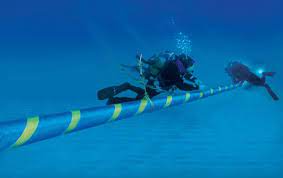Green light for Italy’s €1.3 billion, 1 GW submarine power line

Rome: Italy’s Ministry of Environment and Energy Security has given its approval for the Adriatic Link submarine power line, set to facilitate the integration of renewable sources and support energy transition goals in Italy.
The Italian Ministry of Environment and Energy Security authorized, through a decree dated January 31, the realization of the submarine power line that will connect the regions of Marche and Abruzzo, developed by transmission system operator (TSO) Terna.
The project, included among the interventions outlined in the National Integrated Plan for Energy and Climate (PNIEC) and recognized as strategic for the country, is set to strengthen energy exchange in central Italy, addressing the security and flexibility needs of the national electrical system and the targets for growth in renewables.
“We are very pleased with the approval obtained from the Ministry of Environment and Energy Security for the Adriatic Link, one of the fundamental projects of Terna’s Ten-Year Development Plan,” said Giuseppina Di Foggia, CEO and General Manager of Terna.
“The infrastructure, for which we will invest approximately € 1.3 billion, will enhance the security and resilience of the national power grid and contribute to achieving the goals set by the National Integrated Plan for Energy and Climate, confirming Italy’s role as a European and Mediterranean energy hub.”
Adriatic Link will consist of two submarine cables approximately 210 kilometers long, laid at a maximum depth of 100 meters, and two underground cables of 40 kilometers. Conversion stations will be built near the existing electrical substations in Cepagatti (Pescara), Abruzzo, and Fano (Pesaro-Urbino), Marche.
Italian cabling giant Prysmian will deliver cables for the project.
The infrastructure will allow an increase of approximately 1 GW in exchange capacity between Italy’s Centre-South and Centre-North zones, enabling the integration and transfer of energy produced by wind and photovoltaic plants in the South to consumption centers in the North.
According to Terna, the authorization is the result of constant dialogue between the Ministry and Terna and the extensive consultation process initiated by the company with the local community. Since December 2020, the dialogue in the design and public consultation phases has resulted in over 120 meetings held with regional and municipal administrations, associations, and citizens.
Minister Gilberto Pichetto Fratin said: “With the ministerial authorization of the Adriatic Link, another piece is placed in the path undertaken by the State with Terna to achieve the European decarbonization goals of the Italian energy system in line with the objectives outlined in the National Integrated Energy and Climate Plan.”





